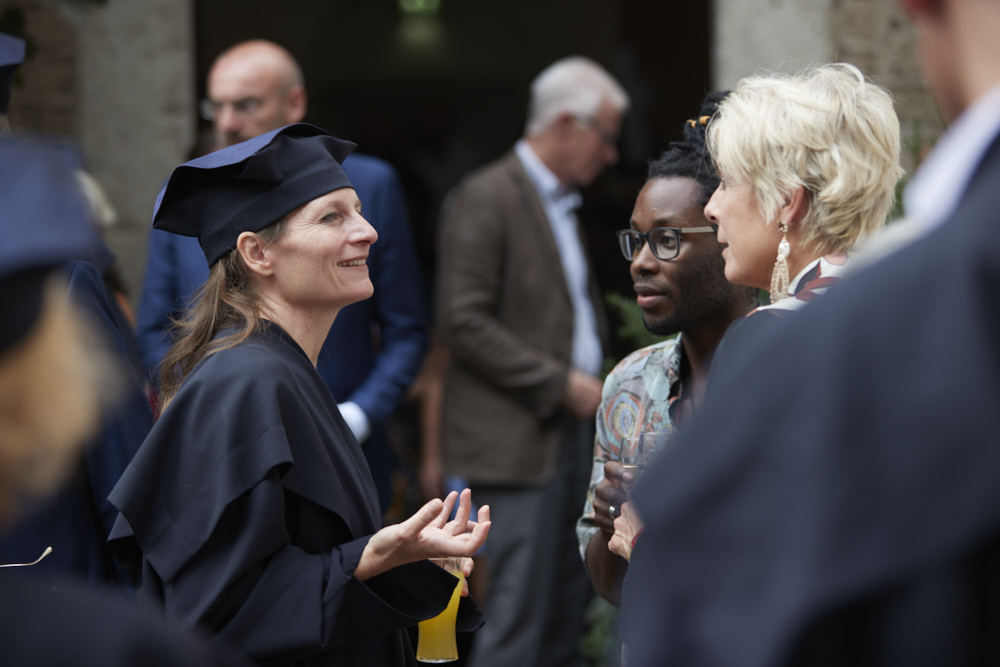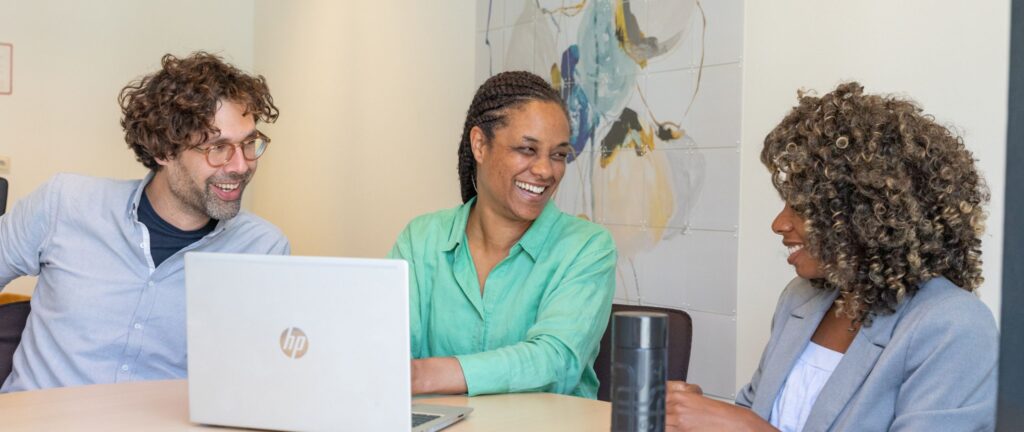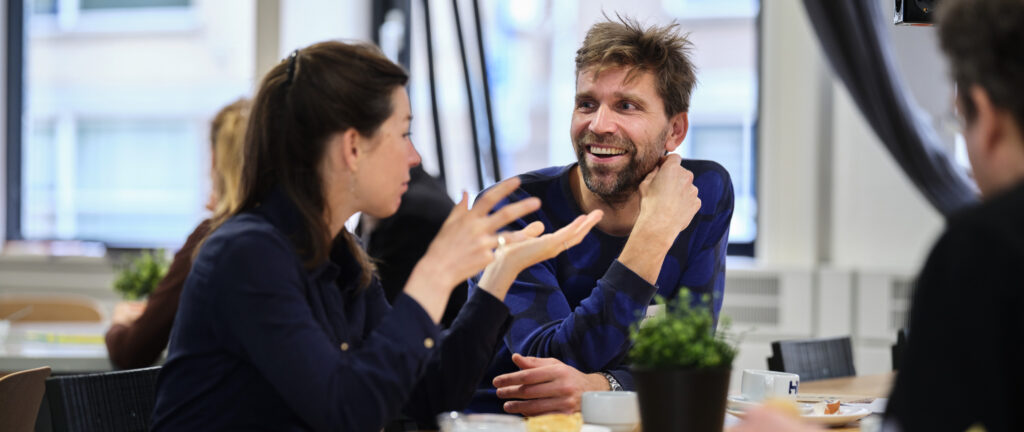Meaningful Artistic Research (MAR): collaboration UvH and HKU

The University of Humanistic Studies (UvH) and HKU University of the Arts Utrecht work together in the field of artistic research. This sustainable partnership is called Meaningful Artistic Research (MAR).
About Meaningful Artistic Research
Meaningful Artistic Research (MAR) brings the University of Humanistic Studies (UvH) and HKU University of the Arts Utrecht together around a shared commitment: artistic research has innovative potential. At the heart of MAR lies the belief that artistic and creative practices produce forms of knowledge that are essential for imagining and cultivating caring, just, and sustainable ways of living together.
Artistic research is practice-based and practice-led research in the arts, in which knowledge is generated in and through artistic practice itself, with attention to the material, embodied, and performative dimensions of making and thinking. It opens space for critical experimentation, imagination, and creative transformation. By research through making – and making through researching – we learn to see and understand differently. New perspectives open across artistic, academic, and societal contexts.

Mission
MAR’s mission is threefold:
- to build a knowledge community that actively shares and further develops these insights in collaboration with relevant partners.
- to educate a new generation of artistic researchers who generate knowledge through their practice,
- to develop forms of education in which students learn to work in transdisciplinary ways across the intersections of art, academia, and society,
This mission starts from the understanding that artistic research may relate to research into, for, and reflection on the arts, but is first and foremost a mode of knowledge production through the arts. Making and thinking, theory and practice, perception and action exist in dynamic and reciprocal relation.
Artistic PhD trajectory
The MAR partnership offers the possibility to pursue a PhD trajectory in artistic research. In this programme, the creative process is recognised is a fully-fledged research methodology, and artistic work forms an integral part of the dissertation. Artistic practice is therefore treated as a form of critical and creative inquiry, not as an illustration of academic insights. Artistic and academic modes of knowledge creation iteratively and reciprocally shape one another.
The artistic PhD trajectory is embedded in the Graduate School of the University of Humanistic Studies. Doctoral students are supervised by an interdisciplinary team from both institutions and are part of a research environment in which artistic practice, theoretical reflection, and societal engagement are deeply intertwined. They participate in the research communities of HKU and UvH and contribute to seminars, workshops, and public presentations of research.
Would you like to learn more about the PhD trajectory, admission requirements and the application procedure? Please check out the Graduate School website.
Current PhD projects
-
Habiba Afifi
Habiba Afifi explores the notion of ‘radical rest’ as an artistic and spiritual mode of inquiry. This notion creates space for more-than-human ways of knowing. Her practice – rooted in ceramics, fertile soil, and speculative fabulation – invites slowness, ecological attentiveness, and co-creation.
Drawing on the concept of Al-Barzakh from Sufi cosmology – a liminal space where the soul resides after death and before resurrection – Habiba Afifi imagines rest not so much as as a form of personal or political recovery, but rather as a deliberate surrender. This way, rest can disrupt capitalist rhythms in favour of human and more-than-human care, slowness, and relational presence.
-
Simona Kicurovska
Simona Kicurovska investigates how digital automation technologies, such as algorithms and AI, are transforming the field of graphic design. She questions what cannot be programmed in digital design systems and what only designers can do. Her research focuses on ‘designer ways of knowledge’, which contribute to socially responsible engagement in times of automated, algorithmic design.
-
Milo van der Maaden
At the intersection of artistic research, queer and trans* care ethics and critical pedagogy, Milo van der Maaden investigates how queer and trans* deviant practices generate critical and creative forms of care and learning. These practices, often labeled as ‘deviant’, are born from systemic exclusion and resistance to oppressive norms of gender and sexuality. They are a source of critical and creative knowledge.
Through participatory methods such as performance and ‘anarchiving’ – an alternative, embodied and shared mode of archiving non-normative knowledges – Milo approaches these practices as pedagogies of care.
-
Zoya Sardashti
In a time of growing societal polarization, Zoya Sardashti investigates how performance and performative methods can contribute to nonviolent, relational forms of dialogue. Using practice-as-research methodology, autoethnographic inquiry, and Judith Butler’s work on the ethics of nonviolence, this artistic research develops performative interventions that reach beyond rigid identity frameworks.
Zoya Sardashti approaches ‘translation’ not merely as a linguistic act but as a bodily, relational, and performative process. This way, it is explored how performance can cultivate sustainable forms of nonviolent engagement across cultural and linguistic borders.
-
Marielle Schuurman
Marielle Schuurman investigates Co-creative Artistic Research Ecologies (CARE), that are part of the Creating Cultures of Care programme. In CARE labs, artists and designers work together with residents, clients, professionals, policymakers, students and researchers. Together they explore questions such as ‘what does it mean to live with dementia?’ or ‘what can music mean for nurses, patients and their loved ones after major surgery?’
These artistic practices have a significant impact not only on an individual level, but also on the relationships between all those involved. Mariëlle Schuurman investigates new concepts and practices of care and art that emerge here.
-
Marloeke van der Vlugt
Marloeke van der Vlugt investigates the importance of the sense of touch. Her PhD research into touchability in and through art starts with her own artistic practice. She explores a tactile creative process using sculptural, unpredictable materials and techniques. She then shares the resulting artefacts, such as polyurethane balls with their mysterious contents of naturally coloured plaster, with the public in interactive performances. At a time when touch is easily associated with risk and taboo, Marloeke van der Vlugt seeks ways to activate tactile sensations.
-
Esther Willemse
Esther Willemse, teacher at HKU Art and Economics, is conducting doctoral research into what art experience is and what significance these experiences hold. While walking, listening and writing, she gathers stories of art experiences from students and teachers. Her aim is to arrive at a deeper understanding and to continue exploring their significance for the professionalism of cultural managers.
Involved employees
- Fabiola Camuti
- Marieke Folkers
- Louis van den Hengel
- Andries Hiskes
- Robbert Hoogstraat
- Judith Leest
- Marjanne Paardekooper
- Veerle Spronck
Keeping up to date about MAR?
Project coordinator
Marieke Folkers, marieke.folkers@hku.nl
Related news and events
-

Meaningful Artistic Research: artistic work as a source of knowledge
Published on:Posted in category:News -
MAR event: Becoming Reoriented
Event
On Thursday afternoon, 9 October, there will be a meeting at the UvH organised by the Meaningful Artistic Research partnership, entitled Becoming Reoriented.


